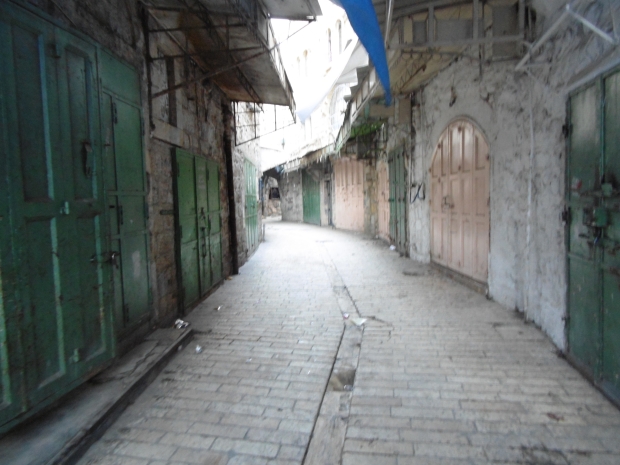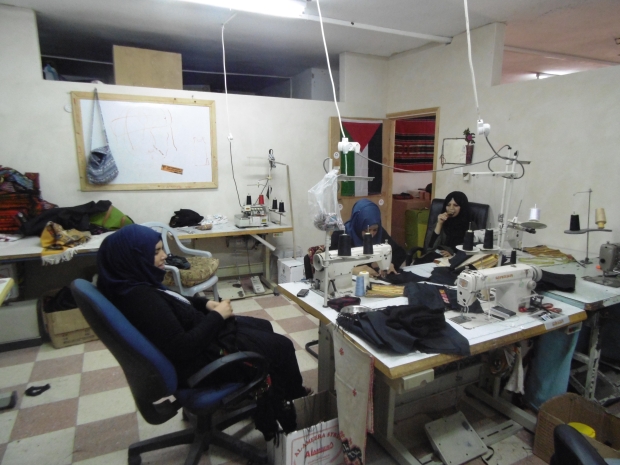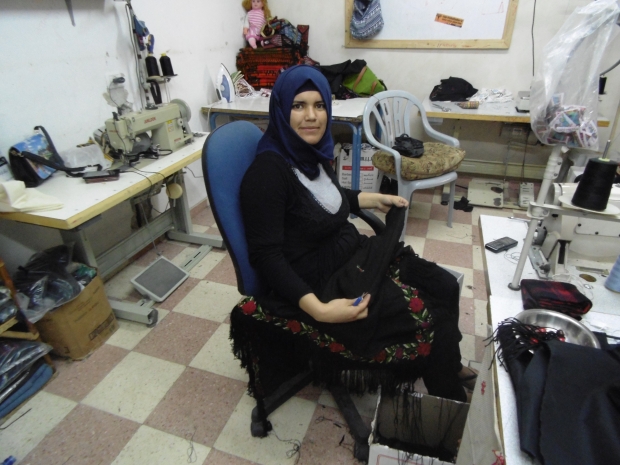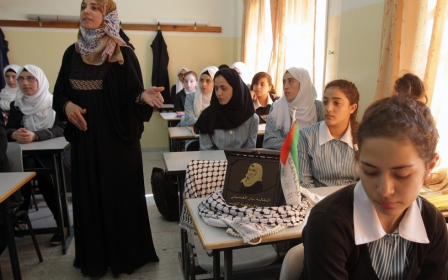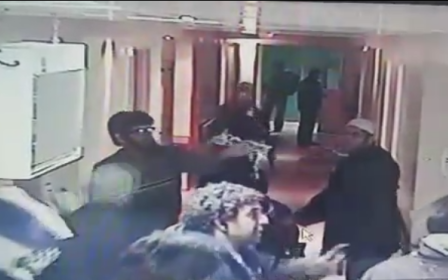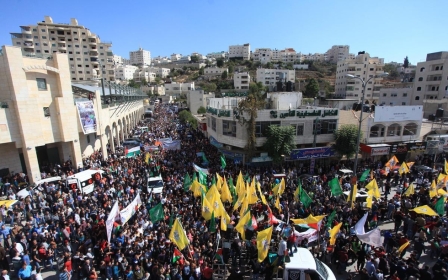Palestinian women resist, expand rights through all-female cooperative
HEBRON, West Bank - In the Old City of Hebron on Sunday, the usually bustling marketplace was eerily quiet, with only a small number of shops open for business.
Hebron has become the epicentre of violence across the West Bank in recent weeks: at the beginning of November, nine Palestinians were shot dead by Israeli forces in Hebron’s Old City in the course of a week, Maan News Agency reported.
These attacks have made many shopkeepers in the Old City reluctant to open, Middle East Eye was told by Leila Awawdeh, one of the few shopkeepers who opened on Sunday.
“It’s a form of resistance to open your shop, to say ‘I am here’ in this bad situation,” Awawdeh said, “This is what we can do to protect our area from the settlers.”
Awawdeh and her family have lived in the Old City for the past eight years, but she has sent her children to stay with a family in a nearby village, as she is too afraid for them to live in Hebron at this time.
“It’s very hard to be here,” she told MEE, but she pledged to stay in her home no matter what happens.
Awawdeh’s Old City shop is the outlet for the all-female fair trade cooperative Women in Hebron, based in the nearby village of Idna.
The cooperative began as a stall in the Old City market in 2005, MEE was told by Nawal Slemiah, the founder of Women in Hebron.
Since then, it has expanded to a group of more than 150 women from eight villages in the Hebron district, who produce and sell traditional Palestinian handicrafts.
Shortly after midday on Sunday, in the village of Idna, located a short distance to the northwest of Hebron, eight women gathered for lunch in the central room of the Women in Hebron cooperative centre.
The women had prepared a large dish of mujadarrah, a traditional Palestinian rice and lentil dish, alongside plates of Arabic salad and plenty of sweet Palestinian tea.
The women took a short break for lunch then returned to various rooms across the centre to continue their sewing and embroidery projects.
'We just want peace'
Nawal Slemiah told MEE that the cooperative was established as a way to empower women in the Hebron district. She sees the cooperative as a means for women to gain more independence, to contribute some income to their families, and also as a way “to resist the occupation in a peaceful way,” by keeping Palestinian heritage alive.
By using Palestinian culture in this way, Slemiah believes that the cooperative is saying to the world, “This is the story of Palestine: we don’t want to kill anyone, we don’t want problems, we just want to live in peace.”
The current situation in Hebron has made Slemiah concerned about the future of the cooperative. Due to the recent violence in the Old City of Hebron, very few people are visiting the market, Leila Awawdeh told MEE.
The shop has received virtually no visitors in recent weeks. Slemiah says that the volatile situation means that the cooperative can no longer rely on sales from within Palestine.
For some of the women involved, they are currently the only members of their households bringing in any income, as other family members have found it difficult to cross the nearby border into Israel for work, Slemiah told MEE.
This financial pressure adds to an already heavy burden which the women involved in the cooperative have to deal with. “The women have so many things to worry about now,” Slemiah told MEE.
She believes that women in Palestine are affected differently by the occupation to men, and this has been especially true during the violence of recent weeks.
The women are under immense stress, worrying about their children travelling to and from school due to the threat of attacks from Israeli soldiers and settlers, Slemiah explained.
On top of this, she believes that in Palestine, many people overlook women’s rights because of the occupation.
They are concerned “about the occupation first before [women’s] rights,” Slemiah told MEE.
Through participation in the cooperative, Slemiah believes that women are given “space to talk about their rights” at home, and through their involvement, their status within their household is improved.
She hopes that these evolving mindsets can also begin to filter out of the home, and that the status of women will improve in the local communities and in wider Palestinian society.
Maysa Sharawna, 23, Nawal Slemiah’s niece and the daughter of Leila Awawdeh, is employed at the cooperative.
She told MEE that very few women in Palestine work, and that the women in the cooperative feel very happy to be empowered and self-reliant.
Women at work
The Palestinian Policy Network, Al-Shabaka, published a policy brief in July 2015 which revealed that Palestine has one of the lowest rates of female participation in the labour force in the world.
The policy brief states that female participation in the labour force is “one of the drivers of economic growth”.
UN Women also states on its website that “when more women work, economies grow”.
Palestine’s low rates of female labour force participation are particularly problematic, according to Al-Shabaka, as “weak economic and social outcomes, including stagnant growth, social fragmentation and gender bias may undermine the capacity of the colonised population to withstand, survive and resist colonialism.”
In 2014, the rate of female labour force participation sat at only 19.4 percent in Palestine, according to Al-Shabaka.
Al-Shabaka affirms that the Israeli occupation has “had a serious impact on Palestinians’ mobility, particularly that of women.”
This lack of mobility reduces employment options for women. Alongside this, the policy brief expresses concern that Palestinian legislation pertaining to employment is “clearly not sufficiently gender sensitive”.
An example of this is the fact that legislation exists to demand that employers treat men and women equally, but there are no procedures in place to penalise those who break this law.
Self-empowerment
Women in Hebron and Slemiah see the cooperative as a feminist organisation: it is not only a way for the women involved to make money, but also a means of self-empowerment for the women.
Abir Awad, 28, started working at the cooperative to learn design. She told MEE that after finishing school she worked at home for a year, but she is much happier now she is able to spend time at the cooperative and socialise with the other women.
Now when she wants to buy something, she doesn’t need to consult her family, as she has her own money, she said.
Haneen Juhbar, 23, also told MEE that working for the cooperative has empowered her to “do something for myself and my future”.
Before she started working at the cooperative, her family were too worried to allow her to leave the house by herself, which meant her personal freedom was limited. Her father only allowed her to go to school for six out of the typical 12 years, and she didn’t have a lot of hope for a future outside of the home.
Freedom and feminism
All of the women MEE spoke to found that through working at the cooperative, they have gained a lot more freedom and independence, and they have more hope for their futures.
The cooperative is gradually growing: sewing machines have been purchased through a grant from the British Consulate, the women have begun a loom project, weaving traditional Palestinian carpets, and they hope to begin to knit as well as embroider, Nawal Slemiah told MEE.
Slemiah hopes to expand the cooperative to include more than 1000 women, and to purchase their own, larger building, which will give them more space than in the centre they currently rent.
Yet the political climate in Palestine has made the women of the cooperative uncertain about the future.
Leila Awawdeh encourages people who are interested in Palestine to visit. She enjoys showing visitors the products in her shop and talking to them about life in Hebron.
Through this involvement with Women in Hebron, she can celebrate Palestinian culture, show visitors what Palestinian women can do, and on top of that, support her family, she told MEE.
Awawdeh said: “I feel stronger since I came to Women in Hebron, I am more independent, I can do what I like.” Maysa Sharawna echoed this statement of her mother, and told MEE that by being a part of Women in Hebron, “I don’t need anyone, just myself.”
Middle East Eye propose une couverture et une analyse indépendantes et incomparables du Moyen-Orient, de l’Afrique du Nord et d’autres régions du monde. Pour en savoir plus sur la reprise de ce contenu et les frais qui s’appliquent, veuillez remplir ce formulaire [en anglais]. Pour en savoir plus sur MEE, cliquez ici [en anglais].


